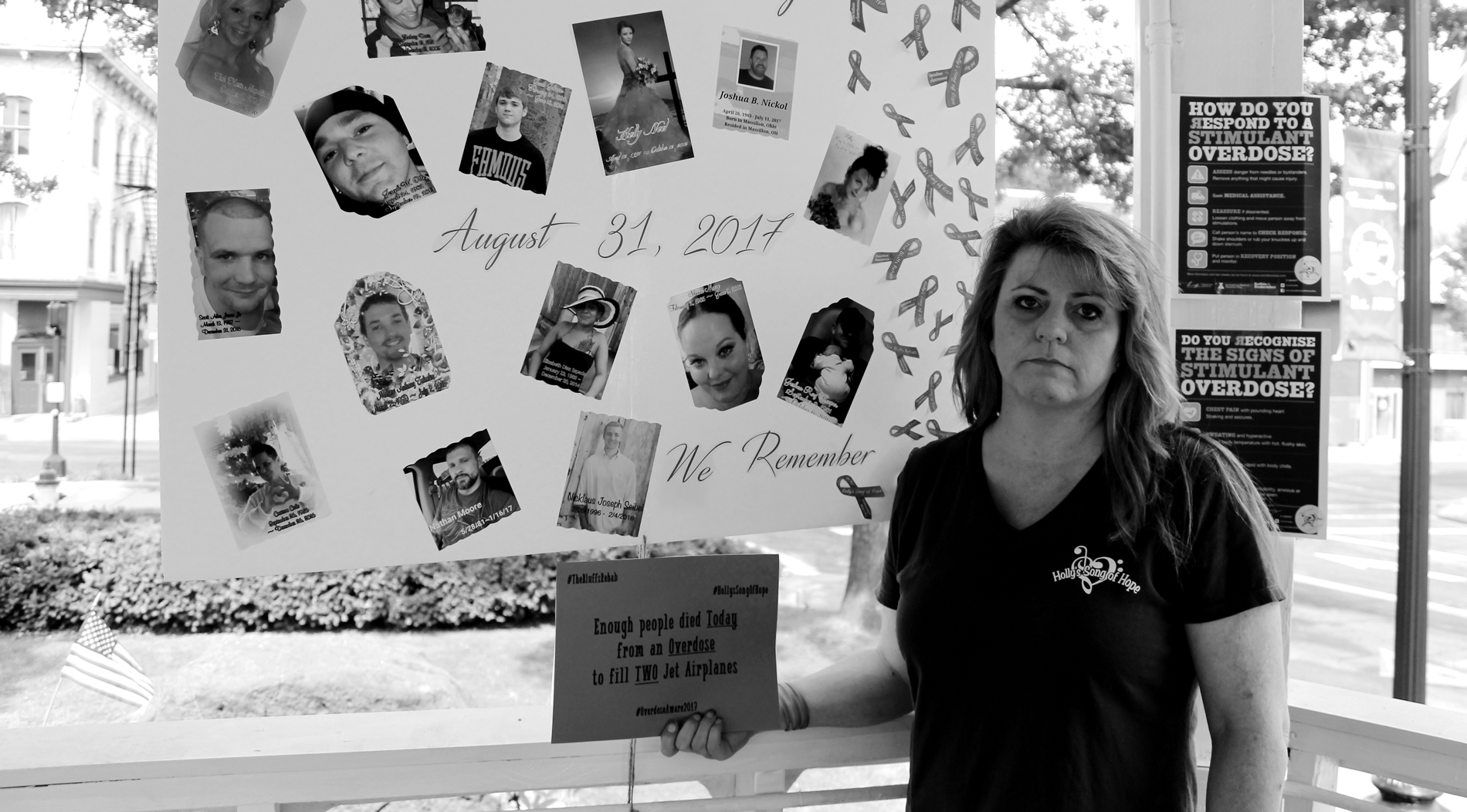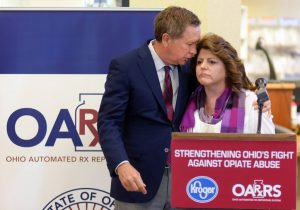I never thought curiosity would kill my child — but it did.” Tonda DaRe’s, youngest daughter, Holly, died Oct. 12, 2012, from an opioid overdose. One year, to the day, before their planned wedding, Holly’s fiance found her collapsed on the bathroom floor.
Later, it was reported there were 13 deaths caused from the same batch of heroin in a 24-hour period. They now believe it was one of the first batches of fentanyl that came through Carroll County, said Tonda. Taking what Holly thought was her “normal” amount was at least three times what her body was used to. It killed her instantly. Holly, 21, left her fiance and their toddler son, Noah, other family members and friends — painfully grasping for one more hug.
The struggle
Holly and her fiance had experimented with drugs for three months. Then, with the support of their families sought help at rehabilitation centers. Holly spent two months in a treatment center and when she left it, got her life back on track. Tonda thought, “OK, we are good.”
Holly and her fiance lived clean for 14 months. She got a job at Atwood Lodge, then hit a rough patch. “Her boss was ignorant and very inappropriate,” Tonda said. “To deal with it, she started using again.” Holly’s fiance told Tonda he had caught her doing drugs about two weeks before she died, and he threatened to leave and take Noah. He thought it was enough to get her to stop.
A daughter and sister
“She was like every single child — a smile that lights up the room, everyone loved her. The type of child every parent wishes for,” said Tonda. Holly and her sister Miranda went to Carrollton High School. Holly played sports and had a beautiful voice, taking roles in school musicals and performances. She wanted to be a cosmetologist. Then she met her fiance and began planning their wedding. When she found out she was pregnant, she paused her career plans.

“What makes me the most angry is people think addiction is a choice,” said Tonda, who now works passionately to educate the community about drug abuse. “Ninety percent of those addicted started with pain pills prescribed by their doctor.”
For Holly, this wasn’t the case. She was in the minority, trying drugs simply out of curiosity, Tonda said. “She wanted to know what the big deal was. She tried it and she liked it entirely too much. Curiosity killed my daughter.”
Holly’s Song of Hope
“What I really want to do is stay curled up in a ball on the couch and not move,” Tonda said. But she hasn’t. She’s built a national education and advocacy effort, hoping to spare another family the grief she still feels every day.
Tonda started Holly’s Song of Hope three years ago, as a support group. “I realized that education was lacking, like AIDS was until people understood the stigma. It is the same thing. We need more education about addiction.”
She spent two years educating herself. She went to conferences and workshops on addiction and all the ways it impacts individuals and society. When she was ready to start the website and support group, she asked Holly’s friends what it should be called. Remembering Holly’s love of music, her friends decided on Holly’s Song of Hope.
Tonda and her friend Marcie Miller started the group, which now has more than 2,000 members from across the country, and around the world. Holly’s Song of Hope manages a general, public Facebook page and a page that is for members only, so people can be frank about issues they are dealing with, Tonda said. The closed Facebook group includes those in recovery, active users and their friends and family, and loved ones of those who have died from an overdose. Anyone can request to join the group, if they are interested in working as a community to overcome addiction.
“People in recovery will get on the site and give advice to parents — do this or say that — to help them out,” she said. “It is a place to turn.”
Tonda and her team offer educational classes like Addiction 101, a simple way to explain addiction, and how people can get help. She speaks to churches and believes faith is one of the major keys to solving the problem. She visits a prison every six weeks to discuss addiction, and has spoken at businesses, in people’s homes — whenever and wherever people ask her to speak, “I’m in 1,000 percent.”
“People need to understand, addiction is not a moral failing.”
National impact
Tonda and Marcie, who serves as Holly’s Song of Hope’s outreach director, completed a six-week tour in August, covering 13 states and 20 cities east of the Mississippi. They were visiting and supporting members of Holly’s Song of Hope. Tonda also works with U.S. Sen. Rob Portman, R-Ohio, advocating for the Comprehensive Addiction and Recovery Act. In January 2016, she testified before the Senate Judiciary Committee.
“I get a lot of respect for what I am doing in D.C. and Columbus; I am constantly working with our legislators. But around here, I’m still just Holly and Miranda’s mom.”
“Government leaders don’t understand, they need a personal connection. I get real — sharing about the day she died.”
Our problem
“Nobody wants to admit this is a community problem, or they say ‘it’s not my problem.’ If the addicts are in jail or on Medicaid, it is your problem,” she said. “We don’t have a workforce that can pass a drug test — that is a problem.”
Tonda can recite endless facts about addiction, emphasizing the epidemic’s reach. For example, every 25 minutes a baby is born addicted to opioids, according to studies published in the Addiction journal in June. “We have no idea of the health, physical and mental problems — these ripple effects — that could happen to these babies.”
“Hepatitis C is 50 percent higher in every county right now. We know not to share needles, thanks to our AIDS education, but we don’t know that using the same needle on yourself over and over gives you Hep C.”
She knows not everyone will be empathetic to the drug users, but says if more people understood the community impacts, they would listen. “When it starts to hit them with money signs, maybe they’ll pay attention,” said Tonda.
She supports drug take back programs and Project DAWN — (Deaths Avoided with Naloxone), which brought naloxone, the opioid-overdose antidote, to county health departments.
Today, because of Tonda’s efforts, Carroll County law enforcement members carry naloxone. When Holly was discovered and 911 was called, it took an ambulance 35 minutes to arrive, said Tonda. A sheriff’s deputy was there in three minutes. If that deputy would have been equipped with Narcan, she adds, Holly might still be alive.
Offering hope
Bill Burns, a Youngstown businessman, purchased Atwood Lodge from the Carroll County Commissioners and has partnered with Addiction Campuses, an addiction treatment program. Known as The Bluffs, the 30-day residential treatment facility is now taking clients in its 160-bed facility, with 35 of those beds reserved for detox.
This company, which has four other rehab locations, offered Tonda office space to continue her efforts from there, and she is already working with their professional staff to help the clients and their families in any way she can.
Tonda continues to tell her story — Holly’s story — and works with government officials, hoping they will declare a national state of emergency. “Addiction kills two jets’ worth of people every day. If two jets were crashing every single day, people would come together to stop it from happening.”
Bring in the hospital ships, she said, we need the help.
(Reporter Katy Mumaw welcomes feedback by phone at 330-337-3419 or by email at katym@farmanddairy.com.)















